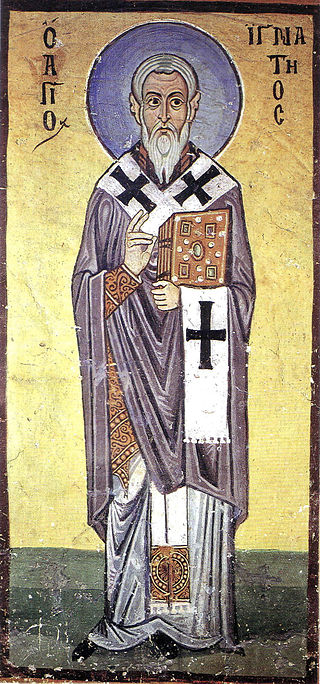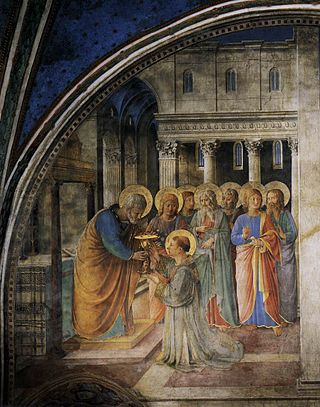
Ignatius of Antioch, also known as Ignatius Theophorus, was an early Christian writer and Patriarch of Antioch. While en route to Rome, where he met his martyrdom, Ignatius wrote a series of letters. This correspondence forms a central part of a later collection of works by the Apostolic Fathers. He is considered one of the three most important of these, together with Clement of Rome and Polycarp. His letters also serve as an example of early Christian theology, and address important topics including ecclesiology, the sacraments, and the role of bishops.

John Chrysostom was an important Early Church Father who served as Archbishop of Constantinople. He is known for his preaching and public speaking, his denunciation of abuse of authority by both ecclesiastical and political leaders, his Divine Liturgy of Saint John Chrysostom, and his ascetic sensibilities. The epithet Χρυσόστομος means "golden-mouthed" in Greek and denotes his celebrated eloquence. Chrysostom was among the most prolific authors in the early Christian Church.

Theodoret of Cyrus or Cyrrhus was an influential theologian of the School of Antioch, biblical commentator, and Christian bishop of Cyrrhus (423–457).

Proclus was the archbishop of Constantinople from 434 until his death. Renowned for his homiletic abilities, Proclus played a central role in the Nestorian controversy. His contributions to the theology of the developing cult of the Virgin Mary place him among the early and foremost Marian theologians. He is venerated as a saint in the Catholic Church, the Eastern Catholic Churches, the Eastern Orthodox Church, and Oriental Orthodoxy.
2 Maccabees, also known as the Second Book of Maccabees, Second Maccabees, and abbreviated as 2 Macc., is a deuterocanonical book which recounts the persecution of Jews under King Antiochus IV Epiphanes and the Maccabean Revolt against him. It concludes with the defeat of the Seleucid Empire general Nicanor in 161 BC by Judas Maccabeus, the leader of the Maccabees.

Babylas was a Syrian patriarch of Antioch (237–253), who died in prison during the Decian persecution. In the Eastern Orthodox Church and Eastern Catholic Churches of the Byzantine rite his feast day is September 4, in the Roman Rite, January 24. He has the distinction of being the first saint recorded as having had his remains moved or "translated" for religious purposes; a practice that was to become extremely common in later centuries.

Doctor of the Church, also referred to as Doctor of the Universal Church, is a title given by the Catholic Church to saints recognized as having made a significant contribution to theology or doctrine through their research, study, or writing.
The Apostolic Fathers, also known as the Ante-Nicene Fathers, were core Christian theologians among the Church Fathers who lived in the 1st and 2nd centuries AD who are believed to have personally known some of the Twelve Apostles or to have been significantly influenced by them. Their writings, though widely circulated in early Christianity, were not included in the canon of the New Testament. Many of the writings derive from the same time period and geographical location as other works of early Christian literature which came to be part of the New Testament.

Theodore of Mopsuestia was a Christian theologian, and Bishop of Mopsuestia from 392 to 428 AD. He is also known as Theodore of Antioch, from the place of his birth and presbyterate. He is the best known representative of the middle Antioch School of hermeneutics.

Lucian of Antioch, known as Lucian the Martyr, was a Christian presbyter, theologian and martyr. He was noted for both his scholarship and ascetic piety.

Aristides the Athenian was a 2nd-century Christian Greek author who is primarily known as the author of the Apology of Aristides. His feast day is August 31 in Roman Catholicism and September 13 in Eastern Orthodoxy.

In Christianity, the Logos is a name or title of Jesus Christ, seen as the pre-existent second person of the Trinity. In the Douay–Rheims, King James, New International, and other versions of the Bible, the first verse of the Gospel of John reads:
In the beginning was the Word, and the Word was with God, and the Word was God.
A ghost word is a word published in a dictionary or similarly authoritative reference work even though it had not previously had any meaning or been used intentionally. A ghost word generally originates from readers interpreting a typographical or linguistic error as a word they are not familiar with, and then publishing that word elsewhere under the misconception that it is an established part of the language.
Baronius Press is a traditional Catholic book publisher. It was founded in London, in 2002 by former St Austin Press editor Ashley Paver and other young Catholics who had previously worked in publishing and printing. The press takes its name from the cardinal Cesare Baronius, a Neapolitan ecclesiastical historian who lived from 1538 to 1607. Its logo is a biretta, which together with a cassock forms the traditional image of a Catholic priest.

The Seven, often known as the Seven Deacons, were leaders elected by the early Christian church to minister to the community of believers in Jerusalem, to enable the Apostles to concentrate on 'prayer and the Ministry of the Word' and to address a concern raised by Greek-speaking believers about their widows being overlooked in the daily diakonia or ministry.
Flavia Domitilla was a Roman noblewoman of the 1st century AD. She was a granddaughter of Emperor Vespasian and a niece of Emperors Titus and Domitian. She married her second cousin, the consul Titus Flavius Clemens, a grand-nephew of Vespasian through his father Titus Flavius Sabinus.
Henry Benjamin Wheatley FSA was a British author, editor, and indexer. His London Past and Present was described as his most important work and "the standard dictionary of London."
Habib the Carpenter, or Habib Al-Nadjar, حبيب النجـّار, was a martyr who lived in Antioch at the time of Jesus Christ. In Muslim tradition, Habib believed the message of Christ's disciples sent to the People of Ya-Sin, and was subsequently martyred for his faith. The Mosque of Habib-i Neccar, below Mount Silpium, contains the tomb of Habib along with that of Sham'un Al-Safa. Some sources have identified Habib with Saint Agabus of the Acts of the Apostles, an early Christian who suffered martyrdom in Antioch at the time of Jesus. This connection is disputed, as Christian tradition holds that Agabus was martyred at Jerusalem, and not at Antioch as Muslims believe of Habib. All Muslim sources list Habib's occupation as a carpenter.

The Church Fathers, Early Church Fathers, Christian Fathers, or Fathers of the Church were ancient and influential Christian theologians and writers who established the intellectual and doctrinal foundations of Christianity. The historical period in which they worked became known as the Patristic Era and spans approximately from the late 1st to mid-8th centuries, flourishing in particular during the 4th and 5th centuries, when Christianity was in the process of establishing itself as the state church of the Roman Empire.











